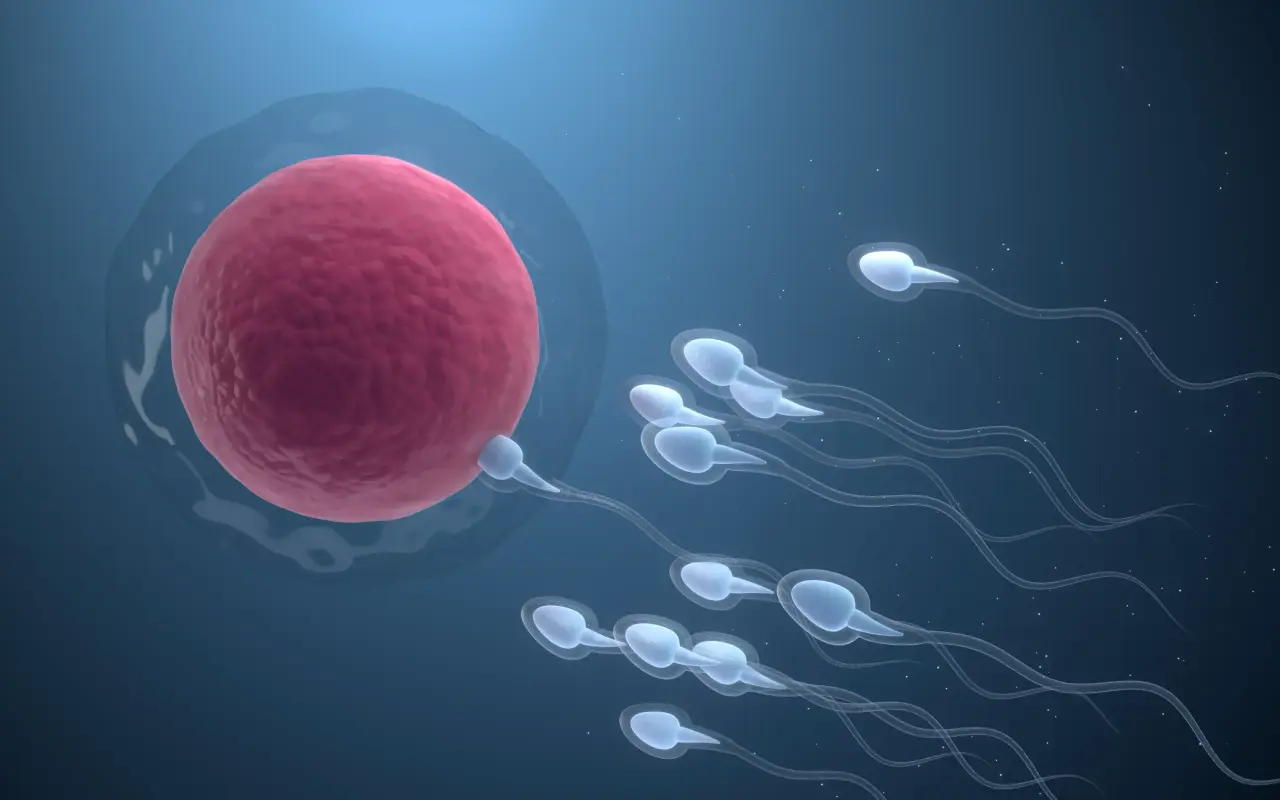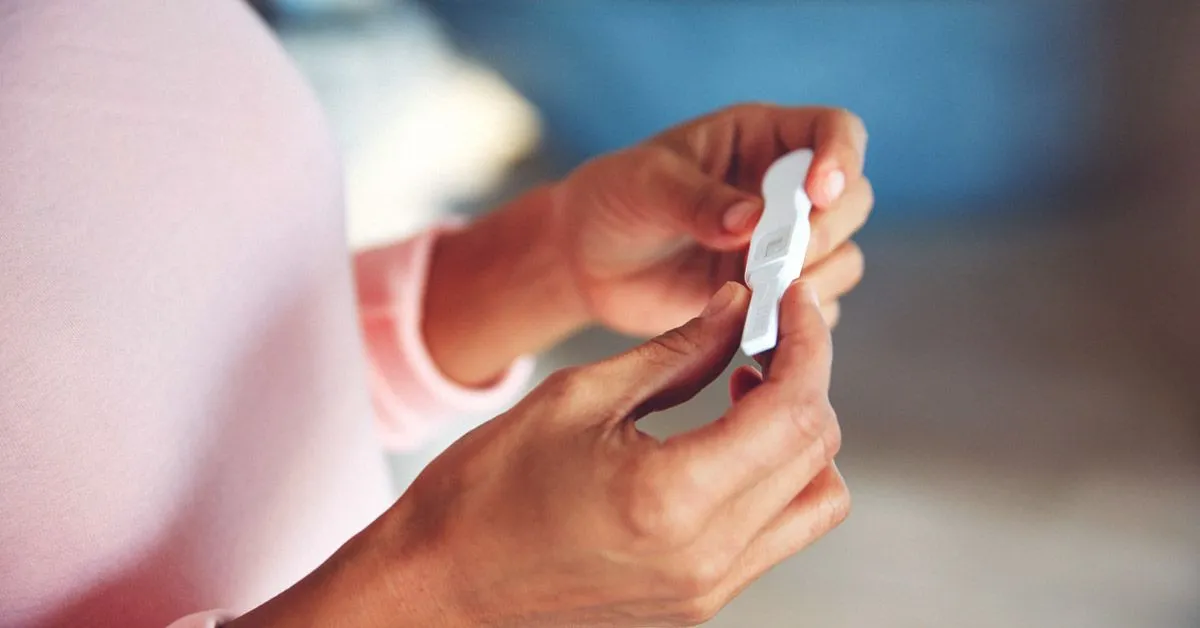Understanding how pregnancy happens is key to making informed choices about your reproductive health. One common question people often ask is: "what are the chances getting pregnant from precum?" And more specifically, what are the chances of getting pregnant from precum three days before ovulation?
This blog breaks down the science behind precum, ovulation timing, sperm survival, and real-life chances of conception. Whether you're actively avoiding pregnancy or trying to conceive, the information here can help you make smarter, chances of getting pregnant from precum 3 days before ovulation.
What Is Precum?

Precum, or pre-ejaculate, is a clear fluid that is released from the penis during sexual arousal, before ejaculation. It is produced by the Cowper’s glands and acts as a natural lubricant for sexual activity.
While precum itself typically does not contain sperm, the story doesn’t end there. Traces of sperm can remain in the urethra from a previous ejaculation and can be carried into the vagina through precum if urination hasn’t occurred since the last ejaculation.
Read Also: How Do You Calculate Pregnancy Weeks After Ivf?
Understanding Ovulation and Fertile Window
Ovulation is the process where a mature egg is released from the ovary, ready to be fertilized. It typically happens about 14 days before your next period, though this can vary depending on cycle length.
The fertile window includes the five days leading up to ovulation and the day of ovulation itself. That’s because sperm can live inside the female reproductive tract for up to 5 days, waiting for the egg to be released.
- So, if intercourse (even just involving precum) happens during this window, pregnancy is biologically possible.
- The Timeline: 3 Days Before Ovulation
- If you're three days away from ovulation:
- You're well within the fertile window.
- Sperm introduced into the vagina at this point can easily survive long enough to meet the egg.
- Even if the exposure was only to precum, there is a risk of pregnancy.
Why?
Because:
Sperm can live up to 5 days in optimal conditions (like fertile cervical mucus).
If viable sperm are present in precum, fertilization can happen once ovulation occurs.
Is There Sperm in Precum?

This is the biggest point of debate when it comes to getting pregnant from precum.
Scientific Findings:
- Some studies suggest that precum may not consistently contain sperm, especially in men who urinate before sex.
- Other research shows that some men do have viable sperm in their precum, even without ejaculation.
- In one frequently cited study published in Human Fertility, sperm were found in the precum of 37% of the participants. In a different sample, 16.7% of precum samples contained motile sperm. While these numbers are not sky-high, they still represent a real risk.
- Even though not all precum contains sperm, you can't assume it's 100% safe.
- Realistic Chances of Pregnancy from Precum 3 Days Before Ovulation
- While it's difficult to pin down exact percentages, here's what we know based on science and fertility research:
- Probability of pregnancy from unprotected intercourse: The general risk of pregnancy per unprotected sex act during the fertile window is about 20–30%.
When only precum is involved, the risk is lower, but not zero.
If ovulation is precisely 3 days away, and sperm survive, the chances increase significantly.
So, the chances of pregnancy from precum 3 days before ovulation may range from 5% to 20%, depending on:
- The presence of sperm in the precum.
- The timing of ovulation.
- The health and motility of the sperm.
- Cervical mucus conditions.
You May Also Like: Folate vs. Folic Acid: Whats the Difference and Why It Matters
Factors That Can Affect Your Risk
1. Cycle Regularity
If your menstrual cycle is regular and you're tracking ovulation accurately, 3 days before ovulation is definitely high-risk.
2. Cervical Mucus
Fertile cervical mucus (egg-white consistency) helps sperm survive and travel. If it's present, sperm from precum may have a better chance of surviving until ovulation.
3. Male Partner’s Sperm Count
Men with high sperm counts may be more likely to have viable sperm in precum, even without ejaculation.
4. Urinating Before Intercourse
If the male partner urinates before sex, it might help flush out leftover sperm, reducing (but not eliminating) the risk.
Common Myths vs. Facts
Myth Reality
- Precum can’t cause pregnancy. False. It can, if it contains sperm.
- You’re safe 3 days before ovulation. False. You're actually very fertile.
- Pulling out is effective birth control. It reduces risk but is only ~78% effective in real-world use.
- You can only get pregnant if the man ejaculates inside. False. Even precum can be enough in the fertile window.
Can You Prevent Pregnancy After Exposure to Precum?

If you've had unprotected sex or are worried about precum exposure during your fertile window, here are your options:
1. Emergency Contraception
Plan B (Levonorgestrel): Most effective when taken within 72 hours.
Ella (Ulipristal acetate): Can be taken up to 5 days after and is often more effective during the fertile window.
2. Tracking Ovulation Better
Use ovulation predictor kits (OPKs), basal body temperature charts, or fertility tracking apps to better understand your cycle and reduce the risk of unplanned pregnancy.
3. Use of Condoms
Condoms are 98% effective when used perfectly and also protect against STIs.
If You're Trying to Conceive (TTC)
If you’re actually trying to get pregnant and wondering if precum could help — it's not the most reliable way to conceive, since the sperm count in precum (if any) may be too low.
To improve your chances:
Track ovulation.
- Have regular, unprotected intercourse during the fertile window.
- Consider seeing a fertility specialist if conception doesn’t happen within a year (or six moths if over 35).
- Emotional and Mental Health Considerations
- If you’re anxious about a possible pregnancy:
- Take a pregnancy test at least 14 days after the act or after a missed period.
- Speak with a healthcare provider for more personalized advice.
- Don’t rely on myths or guesswork; knowledge is power.
Final Thoughts: Should You Worry About Getting Pregnant from Precum 3 Days Before Ovulation?
If you’ve had unprotected sex involving precum during your fertile window, especially three days before ovulation, then yes, there is a real chance of pregnancy. While not as high as with full ejaculation, the risk is not negligible.
Key Takeaways:
- Precum can contain sperm in some cases.
- Sperm can live up to 5 days inside the body.
- Three days before ovulation is a high-fertility period.
- Emergency contraception is available if taken quickly.
- Don’t rely solely on the withdrawal method for birth control.
To avoid surprises, use protection consistently and educate yourself about your reproductive health. Whether you're trying to prevent pregnancy or hoping to conceive, timing, awareness, and action matter.
You May Also Like: Travel Insurance for Pregnant Women: What You Need to Know Before You Go?
Frequently Asked Questions
What are the chances of getting pregnant from precum?

Precum, or pre-ejaculate, is a fluid released before ejaculation that can contain sperm. While the chances of getting pregnant from precum are generally lower than from full ejaculation, pregnancy is still possible. If sperm are present in the precum and ovulation is near, the risk increases. Factors such as sperm survival in the female body, timing of intercourse, and whether the male urinated beforehand (which may flush out sperm) all affect the chances. Using withdrawal as a primary method of contraception is not fully reliable. It’s recommended to use additional protection to reduce pregnancy risk.
Can precum get a girl pregnant?
Yes, precum can potentially get a girl pregnant. Even though it contains less sperm than ejaculate, it may still carry viable sperm, especially if the man has recently ejaculated and hasn’t urinated since. If intercourse occurs during the woman’s fertile window, the likelihood of pregnancy increases. Sperm in precum can travel through the cervix and fertilize an egg. Because the release of precum is involuntary and hard to predict, relying on the withdrawal method (pulling out) is not a foolproof way to prevent pregnancy. Using condoms or other forms of contraception is much safer and more effective.
Can u get pregnant from precum?
Yes, you can get pregnant from precum. Though the sperm concentration is generally lower in precum compared to ejaculate, it can still contain active sperm capable of fertilizing an egg. This is particularly true if the male has ejaculated recently and did not urinate before the next sexual activity. Pregnancy is more likely if intercourse takes place during the female's ovulation period. It’s important to understand that withdrawal is not a reliable method of birth control. To effectively prevent unintended pregnancy, it’s best to use condoms or other proven contraceptive methods consistently and correctly.
Chances of getting pregnant from precum?
The chances of getting pregnant from precum are lower than with full ejaculation but not zero. Studies suggest that some men do have sperm in their precum, which can lead to pregnancy, especially if sex occurs during a woman’s fertile days. The exact probability is hard to quantify, as it varies from person to person based on factors like sperm presence in precum and timing in the menstrual cycle. Withdrawal is often misused and carries about a 20% failure rate per year. To minimize risk, it’s advisable to use barrier methods or hormonal birth control consistently.
How likely is it to get pregnant from precum?
Getting pregnant from precum is less likely than from ejaculate, but it’s still a real possibility. The likelihood depends on several factors, such as the presence of sperm in the fluid, timing of intercourse during the menstrual cycle, and the male partner’s ejaculation habits. Even a small number of sperm can fertilize an egg if conditions are right. If sex happens close to ovulation, the chances are higher. Since precum can be released before a man realizes it, and since withdrawal isn’t always perfectly timed, unintended pregnancies can occur. Protection is recommended to reduce risk.
What are the chances to get pregnant by precum?
The chances of getting pregnant by precum exist, although they are relatively low compared to ejaculation. Research shows that some men have motile sperm in their precum, especially if they have ejaculated recently and didn’t urinate afterward. Since it's hard to detect when precum is released and whether it contains sperm, the risk of pregnancy—though small—is real. Additionally, if intercourse occurs during a woman’s fertile window, the likelihood of conception increases. Therefore, depending solely on withdrawal is risky. Using condoms or other birth control options provides greater peace of mind and effectiveness in preventing pregnancy.
What is the probability of getting pregnant with precum?
The probability of getting pregnant with precum varies, but estimates suggest it’s possible in some cases, especially during a woman’s fertile period. Some studies have found motile sperm in the precum of certain men. The withdrawal method has a typical-use failure rate of about 20%, partly due to precum-related pregnancies. Factors like timing, sperm viability, and whether the male urinated after prior ejaculation affect the odds. Although the probability is lower than with ejaculate, it is not zero. For those not planning a pregnancy, relying solely on withdrawal is not advised—use effective contraception instead.
Can you get pregnant with precum?
Yes, you can get pregnant with precum. While not as sperm-rich as ejaculate, precum can still contain sperm, especially if a man recently ejaculated and hasn't urinated. Since precum can be released unnoticed before orgasm, it can enter the vagina during intercourse and lead to fertilization if the woman is ovulating. Because the presence of sperm in precum varies from man to man, there's no guaranteed "safe" window when using the withdrawal method. This is why health experts recommend using additional contraception methods like condoms or birth control pills to reliably prevent pregnancy.
Can you get pregnant from precum without penetration?
It’s unlikely but not impossible. If precum comes into contact with the vaginal opening, sperm may enter and cause pregnancy.
What are the chances of pregnancy if my partner pulled out but precum touched me?
Still possible—especially during your fertile window. The risk varies but is not zero.
Can you get pregnant from precum during menstruation?
The chances are very low, but not 0%, especially if you have a short cycle and ovulate early.
Can you get pregnant from precum 3 days before ovulation?
Is it possible to conceive from cum three days prior to ovulation? Yes, if there are sperm in the precum. The five days leading up to and including the day of ovulation are known as your fertile window. Additionally, the final three days of this window are when you have the highest chance of becoming pregnant.
Is precum the most fertile?
How likely is it that using Precum will result in pregnancy? "Your chances are very low," is the standard response. Rarely, though, live sperm may be found in the precum, making subsequent pregnancy conceivable.
How fertile are you 3 days before ovulation?
Ideally, you should begin "trying" three days before to the actual occurrence of ovulation. Based on the day of sexual activity, the following are the day-specific pregnancy probabilities: 27% three days prior to ovulation 33% two days prior to ovulation
Can you do pull out method 3 days before ovulation?
You are protected against getting pregnant if you utilize the pull-out method outside of this window since you are not fertile. Even if you employ the pull-out method, your chances of becoming pregnant increase as the ovulation day approaches inside that five-day window prior.
Conclusion
When it comes to reproductive health, precum should not be underestimated. Though it may seem harmless, in the right circumstances—especially three days before ovulation—it can lead to pregnancy.
Be informed. Be prepared. And always take steps to protect your body and your choices.








